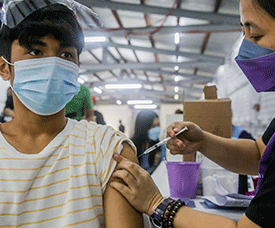 |
| A boy is inoculated with a COVID-19 vaccine at a sports complex in Marikina City, the Philippines. --Photo Xinhua |
WHO calls for greater vigilance amid fast-spreading Omicron variant
MANILA (Xinhua) -- World Health Organisation (WHO) regional director for the Western Pacific Takeshi Kasai has urged people to remain vigilant against the spread of the potentially more transmissible Omicron coronavirus variant.
The Manila-based WHO regional office said many countries are reporting detection of Omicron increasing daily. “Geographic distribution is likely already wider than currently reported,” warned the agency.
At a virtual press conference, Kasai stressed the need to prepare for new surges of COVID-19 infections driven by the Omicron variant, adding that information suggests that Omicron “may be more transmissible than other variants.”
Several countries, including the Philippines, have imposed travel restrictions to keep the Omicron variant out of their shores. However, Kasai warned that “blanket travel bans can delay entry of the Omicron variant but will not prevent entry.”
“Border controls can delay the virus coming in and buy time, but every country and every community must prepare for new surges in cases,” Kasai told a virtual news conference.
“It is clear that this pandemic is far from over, and we can adapt the way we manage this virus to better cope with the future surges and reduce their health, social and economic impacts,” he added.
Kasai outlined calibrated response measures that countries can implement to avoid the “red line” or the situation where the number of critical cases exceeds the hospital and intensive care unit capacity.
He said the region can avoid the “red line” and continue to open societies and economies by vaccinating more people, maintaining the right mix of public health and social measures, and ensuring hospital beds are available for those who need them.
“With a sustainable approach to protective measures, calibrated to each context, we can avoid swinging back and forth between opening up and going back into strict lockdowns,” he added. Kasai said the set of measures he outlined “is all about adapting so that we can learn to ‘live with’ the virus over the long term, even when we have new surges in the future.”
He clarified that the measures are not meant to give up on controlling COVID-19. “Instead, it means continuously calibrating a combination of tools and actions based on the risks in each local setting, as they evolve over time.”
“This is what we need to be doing in response to Omicron, based on what we know now, and adapting our response if needed as we learn more about its transmissibility, severity and impact,” he said.
“We can adapt so that COVID-19 has less impact on our lives in 2022, and we can start to regain - and hopefully retain - a sense of normality,” he said.
(Latest Update December 7, 2021)
|